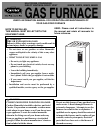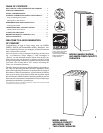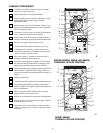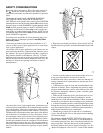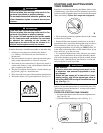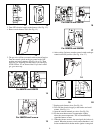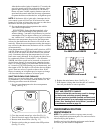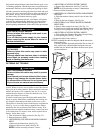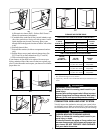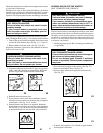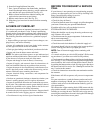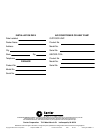
4
SAFETY CONSIDERATIONS
Recognize safety information. This is the safety-alert sym-
bol . When you see this symbol on the furnace and in
instructions or manuals, be alert to the potential for personal
injury.
Understand the signal words—DANGER, WARNING,
CAUTION and NOTE. DANGER, WARNING and
CAUTION are used with the safety-alert symbol. DANGER
identifies the most serious hazards which
will
result in severe
personal injury or death. WARNING signifies hazards which
could
result in personal injury or death. CAUTION is used
to identify unsafe practices which
may
result in minor per-
sonal injury or product and property damage. NOTE is used
to highlight suggestions which
will
result in enhanced instal-
lation, reliability or operation.
To minimize the possibility of serious personal injury, fire,
furnace damage, or improper operation;
carefully follow
these safety rules:
• Your new gas furnace may have been installed in 1 of 2
ways, as a direct-vent (2-pipe) application or as a non-direct
vent (1-pipe) application.
• In a direct-vent (2-pipe) application, your furnace uses air
from outside the home for combustion and vents flue gas to
the outdoors. This type of application will have 2 pipes run-
ning from the furnace to the outdoors. (See Fig. 5.) In this
application, the vent and air-intake pipes must terminate out-
side the structure and must not be obstructed in any way. Do
not block or obstruct air openings on furnace or spaces
around furnace.
5
• In a non-direct vent (1-pipe) application, your furnace uses
air from adjacent to the furnace for combustion and vents flue
gas to the outdoors. This type of application will have only
1 pipe running from the furnace to the outdoors. (See Fig. 6)
The other pipe will terminate in the same space as the furnace
and is the source of combustion air for your furnace. There-
fore, the furnace must not be enclosed in an airtight room or
be sealed behind solid doors. It must have adequate airflow
for efficient combustion and safe ventilation. Do not obstruct
the combustion-air pipe in any way. The vent pipe must ter-
minate outside the structure and must not be obstructed in any
way. Do not block or obstruct air openings or space around
furnace.
6
• Keep the area around your furnace clear and free of com-
bustible materials, gasoline, and other flammable liquids and
vapors.
7
• Do not cover the furnace, store trash or debris near it, or
in any way block the flow of fresh air to the unit.
In addition to the safety rules above, make sure that the fol-
lowing combustion-air requirements are met for non-direct
vent applications.
• Combustion air must be clean and uncontaminated with
chlorine or fluorine. These compounds are present in many
products around the home, such as water softener salts, laun-
dry bleaches, detergents, adhesives, paints, varnishes, paint
strippers, and plastics.
•
Make sure the combustion air for your furnace does not con-
tain any of these compounds. During remodeling be sure the
combustion air is fresh and uncontaminated. If these compounds
are burned in your furnace, the heat exchangers may deteriorate.
• A furnace installed in an attic or other insulated space must
be kept free and clear of insulating material. Examine the fur-
nace area when the furnace is installed or when insulation is
added. Some materials may be combustible.
• Should the gas supply fail to shut off or if overheating
occurs, shut off the gas valve to the furnace before shutting
off electrical supply.
This furnace contains SAFETY DEVICES which must be
MANUALLY RESET. If the furnace is left unattended for
an extended period of time, have it checked periodically for
proper operation. This precaution will prevent problems
associated with no heat, such as frozen water pipes, etc. See
“Before You Request a Service Call’’ section in this manual.
!



